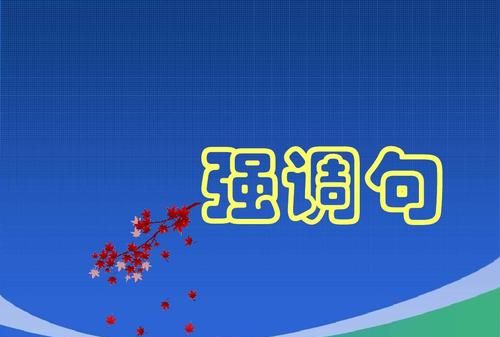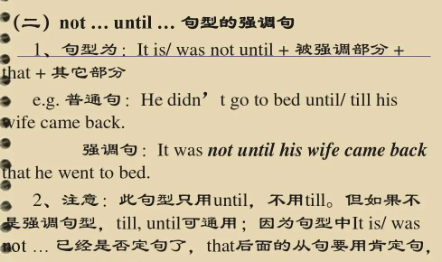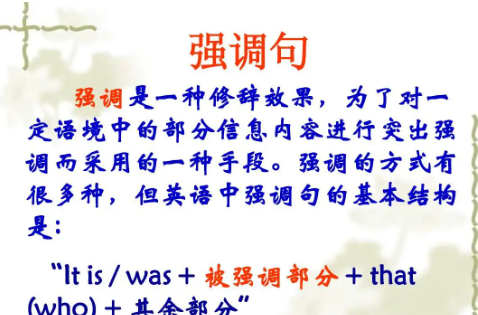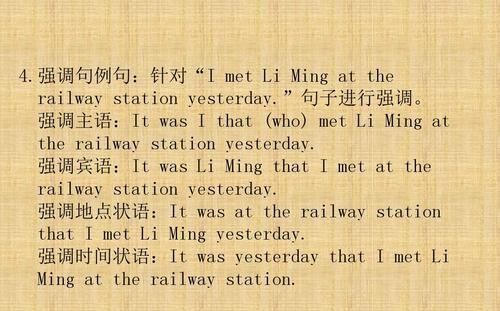本文目录
英语强调句的语法总结
英语强调句的语法
导语:强调句是一种修辞,是人们为了表达自己的意愿或情感而使用的一种形式。下面我解析英语强调句的语法,欢迎参考!

一、在谓语动词前加助动词do, did, does强调该谓语动词,构成强调句
例句: The president of the National Academy, Bruce Alberts, added this key point in the preface to the panel?s report “Science never has all the answers. But science does provide us with the best available guide to the future, and it is critical that our nation and the world base important policies on the best judgments that science can provide concerning the future consequences of present actions. ”
分析: 引号内由两个句子组成, but前一分句是一个简单句,后一分句为两个并列句,其中第一个分句中的does表强调,第二个并列句为一复合句,真正的主语为that our nation and the world base important policies on..., it为形式主语,定语从句that science can provide concerning the future...修饰judgment。
译文: 国家科学院院长布鲁斯·艾伯茨在会议报告的前言中补充和强调了这一点,即科学解答不了所有的问题,但科学的确能给我们提供将来可行的最好的指导,关键是我们国家和其他各国在做重要决策时应该以科学能够提供给我们的、对于人类现在的行为对未来影响的最好的判断作为依据。
二、强调句中谓语以外的其他成分时用强调句型(见词类中it用法)
例句: Often it?s the delivery that causes the audience to smile, so speak slowly and remember that a raised eyebrow or an unbelieving look may help to show that you are making a lighthearted remark.
分析: 该句是复合句,主句it?s the delivery that causes the audience to smile是一个强调句,that a raised eyebrow or an unbelieving look和that you are making a light hearted remark分别作remember以及show的宾语, light?hearted是一个复合形容词修饰remark。
译文: 这是一种经常使听众发笑的讲述方法,所以,讲得慢一些,记住扬一扬眉,或一副不相信的表情可以有助于表现出你正在做一场轻松愉快的评论。
例句: It is the playgoers, the RSC(Royal Shakespeare Company) contends, who bring in much of the town?s revenue because they spend the night(some of them four or five nights) pouring cash into the hotels and restaurants.
分析: 该句是复合句,the RSC contends是插入语,it is the playgoers who bring in much of the town?s revenue是一个强调句,because后是原因状语从句。
译文: 皇家莎士比亚公司坚持说,正是这些票友给镇上带来了丰厚的'收入,因为他们要在此过夜(有些人会逗留四五天),自然也就将钱大把地花在酒店和餐馆里。
三、强调句型it was not until...that...
强调表示时间的名词或时间状语时,常用强调句型it was not until...that..., 意为“直到……才……”。
例句: As was discussed before, it was not until the 19th century that the newspaper became the dominant pre?electronic medium, following in the wake of the book and in the company of the periodical.
分析: 该句是复合句,as指代it was not until the 19th century that...整个内容,分词短语following in...在句中作the newspaper的补足语。
译文: 正如前面所讨论的,直到19世纪继书本、小册子的使用之后,与期刊一起,报纸成为前电子时代最重要的媒介。
例句: It was not until in 1971 that he was allowed to go back to his country.
分析: 该句是复合句。
译文: 直到1971年他才被允许返回自己的祖国。
四、用so表示强调
用so强调听者同意说者所说的话,这种强调是将so提到句前,其他成分位置不变,常省略相同的部分。
例句: Witness payments became an issue after West was sentenced to 10 life sentences in 1995. (选自2001年Cloze Test)
分析: 本句是一个复合句。
译文: 自1995年韦斯特被判处10次终身监禁之后,向证人付款成为一个人们关注的问题。
五、用wh?词引导的名词从句表示强调
例句: But what we forget—what our economy depends on us forgetting—is that happiness is more than pleasure without pain.
分析: 该句是复合句,what we forget和what our economy depends on us forgetting在句中作主语。
译文: 我们所忘记的——我们的经济希望我们忘却的是:幸福远不止是没有痛苦的快乐。
例句: There has to be coordination of programs. What we need is a package deal.
分析: 前句是一简单句,后句是一复合句。
译文: 应该有一个项目上的相互协调,我们需要的是一系列的解决方案。
六、用反身代词表示强调
例句: The authors of the United States Constitution themselves attempted to establish an effective national government while preserving autonomy for the states and liberty for individuals.
分析: 该句是并列句。
译文: 美国宪法的起草者们试图在建立一个有效的国家政府的同时,保持各州的自制权和个人自由。
;英语强调句型结构
、强调句
(一)强调句句型
1、陈述句的强调句型:It is/ was + 被强调部分(通常是主语、宾语或状语)+ that/ who(当强调主语且主语指人)+ 其它部分。
e.g. It was yesterday that he met Li Ping.
2、一般疑问句的强调句型:同上,只是把is/ was提到it前面。
e.g. Was it yesterday that he met Li Ping?
3、特殊疑问句的强调句型:被强调部分(通常是疑问代词或疑问副词)+ is/ was + it + that/ who + 其它部分?
e.g. When and where was it that you were born?
4、强调句例句:针对I met Li Ming at the railway station yesterday.句子进行强调。
强调主语:It was I that (who) met Li Ming at the railway station yesterday.
强调宾语:It was Li Ming that I met at the railway station yesterday.
强调地点状语:It was at the railway station that I met Li Ming yesterday.
强调时间状语:It was yesterday that I met Li Ming at the railway station.
5、注意:构成强调句的it本身没有词义;强调句中的连接词一般只用that, who,即使在强调时间状语和地点状语时也如此,that, who不可省略;强调句中的时态只用两种,一般现在时和一般过去时。原句谓语动词是一般过去时、过去完成时和过去进行时,用It was ... ,其余的时态用It is ... 。 ***.cn
(二)not ... until ... 句型的强调句
1、句型为:It is/ was not until + 被强调部分 + that + 其它部分
e.g. 普通句:He didn't go to bed until/ till his wife came back.
强调句:It was not until his wife came back that he went to bed.
2、注意:此句型只用until,不用till。但如果不是强调句型,till, until可通用;因为句型中It is/ was not ... 已经是否定句了,that后面的从句要用肯定句,切勿再用否定句了。
(三)谓语动词的强调
1、It is/ was ... that ... 结构不能强调谓语,如果需要强调谓语时,用助动词do/ does或did。
e.g. Do sit down. 务必请坐。
He did write to you last week. 上周他确实给你写了信。
Do be careful when you cross the street. 过马路时,务必(千万)要小心啊!
2、注意:此种强调只用do/ does和did ,没有别的形式;过去时用did ,后面的谓语动词用原形。
强 调 句
强调句是一种修辞,是人们为了表达自己的意愿或情感而使用的一种形式,主要有如下几种形式:
1.用助动词“do(does/did)+动词原形”来表示强调:
He does know the place well.他的确很熟悉这个地方。
Do write to me when you get there.你到那儿后务必给我来信。
2.用形容词 very,only,single,such, last 等修饰名词或形容词来加强语气:
That's the very textbook we used last term.这正是我们上学期用过的教材。
You are the only person here who can speak Chinese.你是这里唯一会讲汉语的人。
Not a single person has been in the shop this morning.今天上午这个商店里连一个人都没有。
How dare you buy such expensive jewels?你怎么敢买这么贵的宝石呢?
He is the last person I want to see in this world! 我最不想看他了!
3.用in the world,on earth,at all等介词短语可以表达更强的语气(常用于疑问句):
Where in the world could he be?他到底会在哪儿?
What on earth is it?它究竟是什么?
Do you know at all?你到底知不知道?
4.用感叹句来表示强烈的感情,突出说话人的情感:
How interesting a story it is!这是一个多么有趣的故事啊!
Oh,what a lie!啊,真是弥天大谎!
5. 用重复来表示强调:
Why!why!The cage is empty!啊!啊!箱子是空的。
They walked for miles and miles.他们走了好多英里。
6.用倒装句(也就是将要强调的句子或被强调的部分置于句首)来加强语气:
On the table were some flowers.桌上摆着一些花。(强调地点)
Many a time have I climbed that hill.我多次翻过那座山。
Only in this way,can we solve this problem.只有这样,我们才能解决这个问题。
7.用强调句型:“It is(was)+被强调的部分+that(who)+原句其它部分”来强调说话人的意愿:
It was on Monday night that all this happened.所有这一切发生在周一晚上。
It's me who he blamed.他怪的是我。
8.用If来表示强调:
1)If从句+I don't know who/what,etc.does/is/has,etc.;主语部分也可以用nobody does/is/has,etc.或everybody does/is/has,et c.来代替(这里的if从句往往是正话反说,反话正说):
If he can't do it,I don't know who can.要是他做不了这件事,我不知道还有谁能做。(强调只有他能做)
If Jim is a coward,everybody is.要是吉姆是个胆小鬼,那么人人都是胆小鬼。(强调吉姆不是胆小鬼)
2)if从句+it be主句(此用法可看成是第8中强调句型的变形,即把所要强调的内容放在it be的后面,把其它内容放在由if引导的从句中):
If anyone knew the truth,it was Tom.如果说谁了解事实的真相,那便是汤姆。
If there is one thing he loves,it is money.如果说世界上还有他爱的东西,那便是金钱。
9.用破折号、黑体字也可以表示强调,加强语气:
It's because of hard work—ten years of hard work.那是因为艰苦的工作--十年艰苦的工作!
He began the work in late May.他在五月底开始的这项工作。(强调时间)
强调句的练习
1. ---Were all three people in the car injured in the accident?---No,___ only the two passengers who got hurt.
A. it was B. there is C. it were D. there was
2. ---Who is making so much noise in the garden? --- ___ the children.
A. It is B. They are C. That is D . There are
3. It was ___ she was about to go out ____ the telephone rang.
A. when ; that B. so; that C. before; then D. when; before
4. It was ___ he said ___ disappointed me.
A. what; that B. that; what C. that; when D. it; when
5.____ that silver is not widely used as a conductor?
A. Why is B. Is it why C. Why is it D. Why is that
6.---I can’t find Mr. Smith .Where did you meet him this morning?--- It was in the hotel ___ he stated.
A. that B which C. the one D. where
7.It was in the small house ___ was built with stones by his father ___ he spent his childhood.
A. which; that B, that ;where C, which; which D. that; which
8.It was ___ it was raining so hard that we had to stay at home all day.
A. since B .for C. as D. because
9.Is ____ three hours ____ the boy ___family is poor to come to school on foot?
A .it ;that; whose B. it; that it takes; whose C. it for ;that it takes; whose D. it; when ;that
10. his wife left him without saying goodbye.
A. that B .which C .when D. in which
11. It is a winter night ___he spent with me last night.
A. that B. where C. as D .when
12It is the young man ___ looked for ___ caught the murderer.
A. that; who B. that; they C. they ;that D they ;which
13.It was ____ my teacher worked ____ I work hard.
A. where; that B. where; where C .that; that D. that ;where
14.It was evening__we reached the little town of Winchester.
A that B. until C. since D. before
15.It was until dark ___ he found ___ he thought was the correct way to solve the problem.
A. that; what B. that; that C. when; what D. when; that
16.It was until last year that he ___.
A. left school for a new start
B .came to realize the importance of learning English.
C. worked as an English teacher at a middle school
D .set out to build a new house of his town.
17.It is the ability to do the job ____ matters ,not where you come from or what you are.
A. one B. that C .what D. it
18. I don’t know ____ that you stay here.
A. how long it is B. how long is it C. it is how long D. is it how long
19.It was _____ that caused him to serve dinner an hour later than usual.
A. we being late B. our being late C. we were too late D. because we were late
20.---what was the party like?---Wonderful. It’s years _____ I enjoyed myself much.
A. after B. before C .that D. since

英语强调句型结构
1、强调句的陈述句句型为:It is /was+被强调的部分+that/who引导的从句含瞎+原句其他部分。尼们可以看下面例句来体会理解:
2、强调句的一般疑问句型:Is / Was +it+被强调的部分+that/ who/ whom引导的从句+原句其他的部分。

3、强调句的特殊疑问句型:特殊疑问词(When /Where/ Why/ Who/ What/ How )+is/ was +it +that从句+原句的其他部分。
4、强调句例句:针对I met Li Ming at the railway station yesterday.句子进行强调。
强调唤闷主语:It was I that (who) met Li Ming at the railway station yesterday.
强调宾语:It was Li Ming that I met at the railway station yesterday.
强调地点状语:It was at the railway station that I met Li Ming yesterday.
强调时间状语:It was yesterday that I met Li Ming at the railway station.

强调句和定语从句的混合例句
1、陈述句的强调句型:It is/ was+被强调部分(通常是主语、宾语或状语)+that/ who(当强调主语且主语指人)+ 其他部分。
例句:It was yesterday that he met Li Ping.
2、一般疑问句的强调句型:同上,只是把is/ was提到it前面。
例句:Was it yesterday that he met Li Ping?
3、特殊疑问句的强调句型:被强调部分(通常是疑问代词或疑问副词)+ is/ was + it + that/ who + 其他部分?
例句: When and where was it that you were born?

扩展资料:
1、构成强调句的it本身没有词义。
2、强调句中的连接词一般只用that,who,即使在强调时间状语和地点状语时也如此,that,who不可省略。
3、强调句中的时态只用两种,一般现在时和一般过去时。原句谓语动词是一般过去时、过去完成时和过去进行时,用It was…,其余的时态用It is…。
以上就是关于强调句的例句及翻译 ,英语强调句的语法总结的全部内容,以及强调句的例句及翻译 的相关内容,希望能够帮到您。

